Efficacy, effectiveness, efficiency的区别
- 格式:pdf
- 大小:71.30 KB
- 文档页数:2
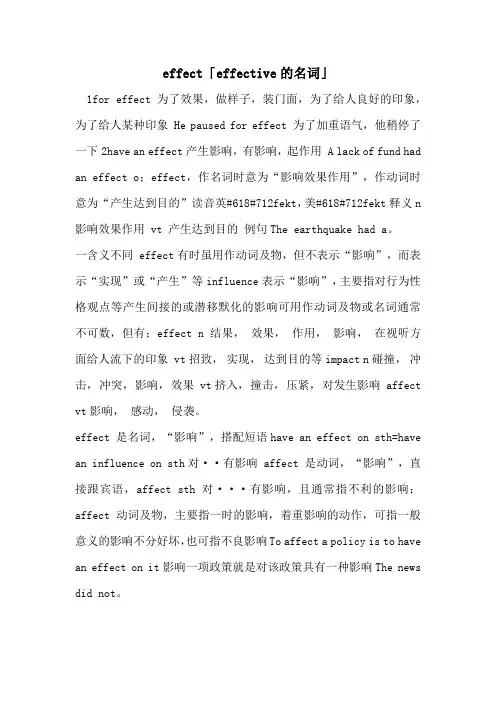
effect「effective的名词」1for effect为了效果,做样子,装门面,为了给人良好的印象,为了给人某种印象 He paused for effect 为了加重语气,他稍停了一下2have an effect产生影响,有影响,起作用 A lack of fund had an effect o;effect,作名词时意为“影响效果作用”,作动词时意为“产生达到目的”读音英#618#712fekt,美#618#712fekt释义n 影响效果作用 vt 产生达到目的例句The earthquake had a。
一含义不同 effect有时虽用作动词及物,但不表示“影响”,而表示“实现”或“产生”等influence表示“影响”,主要指对行为性格观点等产生间接的或潜移默化的影响可用作动词及物或名词通常不可数,但有;effect n结果,效果,作用,影响,在视听方面给人流下的印象 vt招致,实现,达到目的等impact n碰撞,冲击,冲突,影响,效果 vt挤入,撞击,压紧,对发生影响 affect vt影响,感动,侵袭。
effect 是名词,“影响”,搭配短语have an effect on sth=have an influence on sth对··有影响 affect 是动词,“影响”,直接跟宾语,affect sth 对···有影响,且通常指不利的影响;affect 动词及物,主要指一时的影响,着重影响的动作,可指一般意义的影响不分好坏,也可指不良影响To affect a policy is to have an effect on it影响一项政策就是对该政策具有一种影响The news did not。
effective的名词to effect a compromise 达成妥协 The president effected several changes in the company总裁使公司发生了几个变化造成产生效果近义词 consequence , result , issue ,outcome 反义词 cause 短语bring或carry。
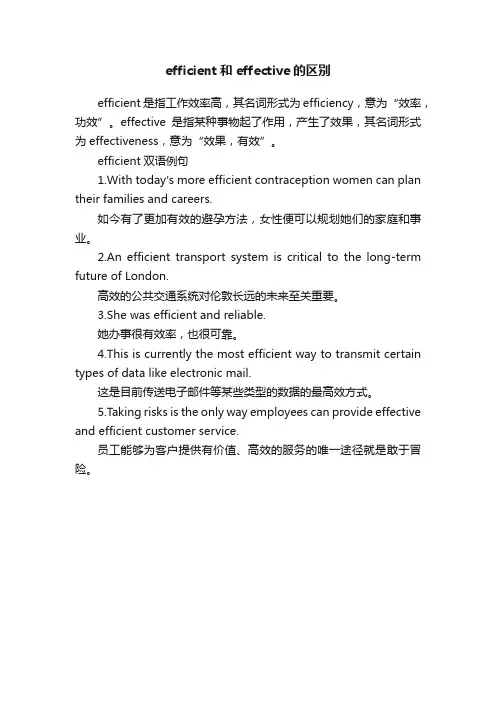
efficient和effective的区别
efficient是指工作效率高,其名词形式为efficiency,意为“效率,功效”。
effective是指某种事物起了作用,产生了效果,其名词形式为effectiveness,意为“效果,有效”。
efficient双语例句
1.With today's more efficient contraception women can plan their families and careers.
如今有了更加有效的避孕方法,女性便可以规划她们的家庭和事业。
2.An efficient transport system is critical to the long-term future of London.
高效的公共交通系统对伦敦长远的未来至关重要。
3.She was efficient and reliable.
她办事很有效率,也很可靠。
4.This is currently the most efficient way to transmit certain types of data like electronic mail.
这是目前传送电子邮件等某些类型的数据的最高效方式。
5.Taking risks is the only way employees can provide effective and efficient customer service.
员工能够为客户提供有价值、高效的服务的唯一途径就是敢于冒险。
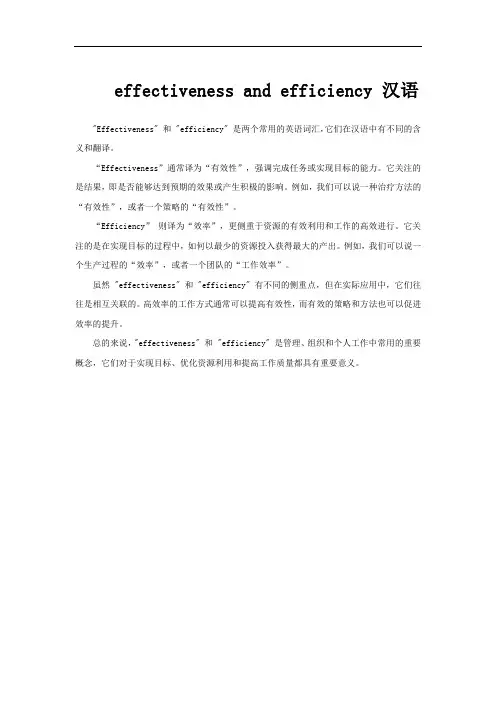
effectiveness and efficiency 汉语
"Effectiveness" 和 "efficiency" 是两个常用的英语词汇,它们在汉语中有不同的含义和翻译。
“Effectiveness”通常译为“有效性”,强调完成任务或实现目标的能力。
它关注的是结果,即是否能够达到预期的效果或产生积极的影响。
例如,我们可以说一种治疗方法的“有效性”,或者一个策略的“有效性”。
“Efficiency”则译为“效率”,更侧重于资源的有效利用和工作的高效进行。
它关注的是在实现目标的过程中,如何以最少的资源投入获得最大的产出。
例如,我们可以说一个生产过程的“效率”,或者一个团队的“工作效率”。
虽然 "effectiveness" 和 "efficiency" 有不同的侧重点,但在实际应用中,它们往往是相互关联的。
高效率的工作方式通常可以提高有效性,而有效的策略和方法也可以促进效率的提升。
总的来说,"effectiveness" 和 "efficiency" 是管理、组织和个人工作中常用的重要概念,它们对于实现目标、优化资源利用和提高工作质量都具有重要意义。
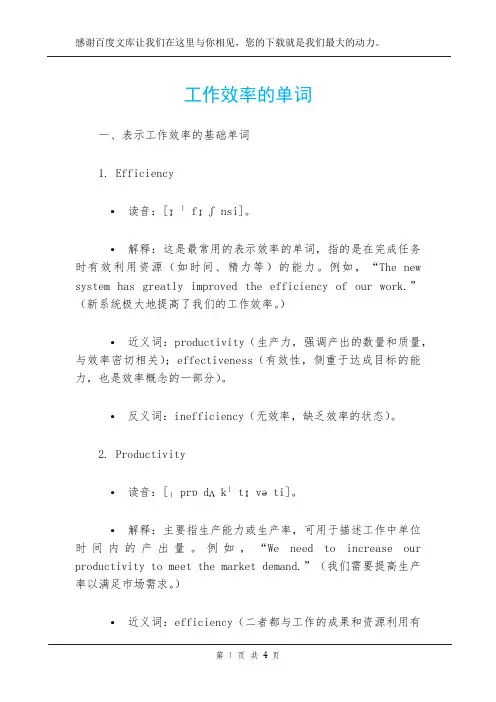
工作效率的单词一、表示工作效率的基础单词1. Efficiency•读音:[ɪˈfɪʃnsi]。
•解释:这是最常用的表示效率的单词,指的是在完成任务时有效利用资源(如时间、精力等)的能力。
例如,“The new system has greatly improved the efficiency of our work.”(新系统极大地提高了我们的工作效率。
)•近义词:productivity(生产力,强调产出的数量和质量,与效率密切相关);effectiveness(有效性,侧重于达成目标的能力,也是效率概念的一部分)。
•反义词:inefficiency(无效率,缺乏效率的状态)。
2. Productivity•读音:[ˌprɒdʌkˈtɪvəti]。
•解释:主要指生产能力或生产率,可用于描述工作中单位时间内的产出量。
例如,“We need to increase our productivity to meet the market demand.”(我们需要提高生产率以满足市场需求。
)•近义词:efficiency(二者都与工作的成果和资源利用有关);output(产出,与生产力概念相关)。
•反义词:unproductivity(非生产性,缺乏生产能力的状态)。
3. Effectiveness•读音:[ɪˌfekˈtɪvnəs]。
•解释:强调达成预期目标的能力,是工作效率的一个重要方面。
如果一项工作虽然速度快但没有达到目的,就缺乏有效性。
例如,“The effectivene ss of this marketing strategy is yet to be proven.”(这个营销策略的有效性还有待证明。
)•近义词:efficiency(效率高往往意味着有效性强);success(成功,成功地达成目标与有效性概念相符)。
•反义词:ineffectiveness(无效性,不能达到目标的状态)。
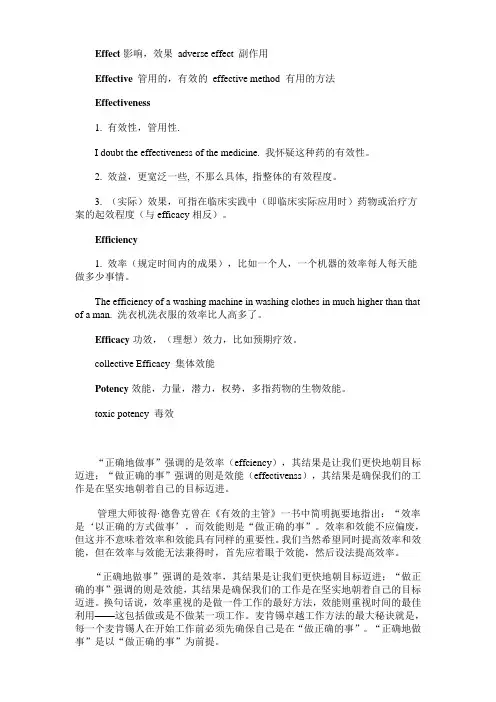
Effect影响,效果adverse effect 副作用Effective管用的,有效的effective method 有用的方法Effectiveness1. 有效性,管用性.I doubt the effectiveness of the medicine. 我怀疑这种药的有效性。
2. 效益,更宽泛一些, 不那么具体, 指整体的有效程度。
3. (实际)效果,可指在临床实践中(即临床实际应用时)药物或治疗方案的起效程度(与efficacy相反)。
Efficiency1. 效率(规定时间内的成果),比如一个人,一个机器的效率每人每天能做多少事情。
The efficiency of a washing machine in washing clothes in much higher than that of a man. 洗衣机洗衣服的效率比人高多了。
Efficacy功效,(理想)效力,比如预期疗效。
collective Efficacy 集体效能Potency效能,力量,潜力,权势,多指药物的生物效能。
toxic potency 毒效“正确地做事”强调的是效率(effciency),其结果是让我们更快地朝目标迈进;“做正确的事”强调的则是效能(effectivenss),其结果是确保我们的工作是在坚实地朝着自己的目标迈进。
管理大师彼得·德鲁克曾在《有效的主管》一书中简明扼要地指出:“效率是‘以正确的方式做事’,而效能则是“做正确的事”。
效率和效能不应偏废,但这并不意味着效率和效能具有同样的重要性。
我们当然希望同时提高效率和效能,但在效率与效能无法兼得时,首先应着眼于效能,然后设法提高效率。
“正确地做事”强调的是效率,其结果是让我们更快地朝目标迈进;“做正确的事”强调的则是效能,其结果是确保我们的工作是在坚实地朝着自己的目标迈进。
换句话说,效率重视的是做一件工作的最好方法,效能则重视时间的最佳利用——这包括做或是不做某一项工作。
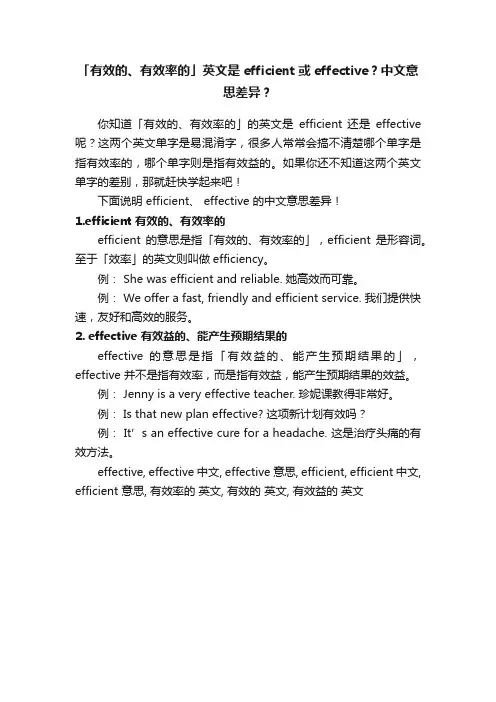
「有效的、有效率的」英文是efficient或effective?中文意
思差异?
你知道「有效的、有效率的」的英文是efficient 还是effective 呢?这两个英文单字是易混淆字,很多人常常会搞不清楚哪个单字是指有效率的,哪个单字则是指有效益的。
如果你还不知道这两个英文单字的差别,那就赶快学起来吧!
下面说明 efficient、 effective 的中文意思差异!
1.efficient 有效的、有效率的
efficient 的意思是指「有效的、有效率的」,efficient 是形容词。
至于「效率」的英文则叫做efficiency。
例: She was efficient and reliable. 她高效而可靠。
例: We offer a fast, friendly and efficient service. 我们提供快速,友好和高效的服务。
2. effective 有效益的、能产生预期结果的
effective 的意思是指「有效益的、能产生预期结果的」,effective 并不是指有效率,而是指有效益,能产生预期结果的效益。
例: Jenny is a very effective teacher. 珍妮课教得非常好。
例: Is that new plan effective? 这项新计划有效吗?
例:It’s an effective cure for a headache. 这是治疗头痛的有效方法。
effective, effective 中文, effective 意思, efficient, efficient 中文, efficient 意思, 有效率的英文, 有效的英文, 有效益的英文。
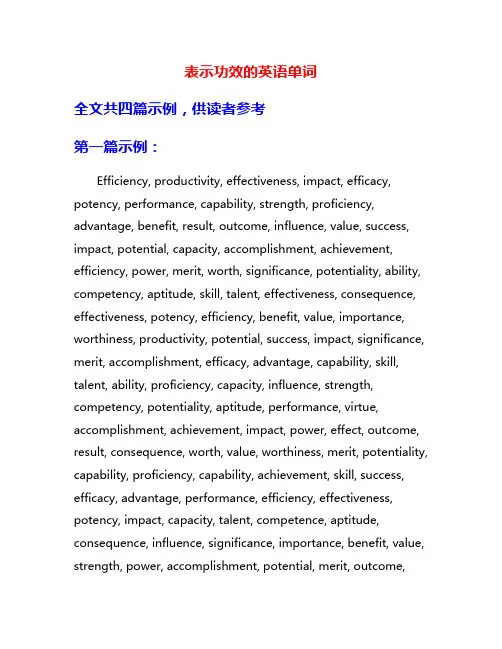
表示功效的英语单词全文共四篇示例,供读者参考第一篇示例:Efficiency, productivity, effectiveness, impact, efficacy, potency, performance, capability, strength, proficiency, advantage, benefit, result, outcome, influence, value, success, impact, potential, capacity, accomplishment, achievement, efficiency, power, merit, worth, significance, potentiality, ability, competency, aptitude, skill, talent, effectiveness, consequence, effectiveness, potency, efficiency, benefit, value, importance, worthiness, productivity, potential, success, impact, significance, merit, accomplishment, efficacy, advantage, capability, skill, talent, ability, proficiency, capacity, influence, strength, competency, potentiality, aptitude, performance, virtue, accomplishment, achievement, impact, power, effect, outcome, result, consequence, worth, value, worthiness, merit, potentiality, capability, proficiency, capability, achievement, skill, success, efficacy, advantage, performance, efficiency, effectiveness, potency, impact, capacity, talent, competence, aptitude, consequence, influence, significance, importance, benefit, value, strength, power, accomplishment, potential, merit, outcome,result, worthiness, achievement, performance, capability, proficiency, efficacy, potentiality, advantage, success, influence, impact, effectiveness, potency, value, worth, importance, merit, significance, benefit, skill, talent, ability, strength, power, capacity, accomplishment, competence, aptitude, consequence, outcome, result, achievement, efficiency, potential, performance, value, efficacy, advantage, impact, merit, productivity, significance, worthiness, potentiality, effectiveness, capability, proficiency, power, importance, talent, success, influence, aptitude, achievement, strength, potency, benefit, skill, value, accomplishment, capacity, performance, efficiency, consequence, result, outcome, impact, worth, effectiveness, significance, worthiness, merit, potentiality, advantage, value, efficacy, capability, productivity, potency, strength, importance, success, proficiency, talent, accomplishment, influence, skill, power, aptitude, competence, capacity, achievement, benefit, impact, effectiveness, potential, achievement, outcome.第二篇示例:表示功效的英语单词在日常生活中扮演着重要的角色,无论是用于描述药物的治疗效果还是用于说明某种产品或服务的性能。
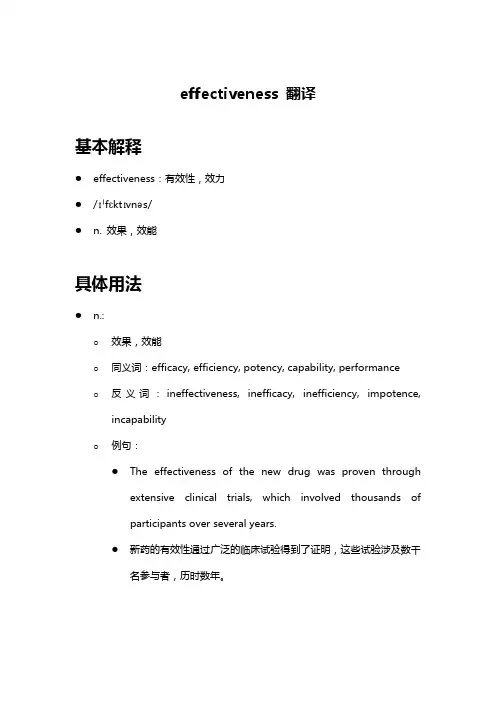
effectiveness 翻译基本解释●effectiveness:有效性,效力●/ɪˈfɛktɪvnəs/●n. 效果,效能具体用法●n.:o效果,效能o同义词:efficacy, efficiency, potency, capability, performanceo反义词:ineffectiveness, inefficacy, inefficiency, impotence, incapabilityo例句:●The effectiveness of the new drug was proven throughextensive clinical trials, which involved thousands ofparticipants over several years.●新药的有效性通过广泛的临床试验得到了证明,这些试验涉及数千名参与者,历时数年。
●Teachers often assess the effectiveness of their teachingmethods by observing student engagement and performance in class.●教师通常通过观察学生在课堂上的参与度和表现来评估其教学方法的有效性。
●The effectiveness of a marketing campaign can be measuredby the increase in sales and brand awareness it generates.●营销活动的有效性可以通过其带来的销售增长和品牌知名度来衡量。
●The effectiveness of the policy will be evaluated based on itsimpact on reducing carbon emissions over the next decade.●该政策的有效性将根据其在未来十年内减少碳排放的影响进行评估。
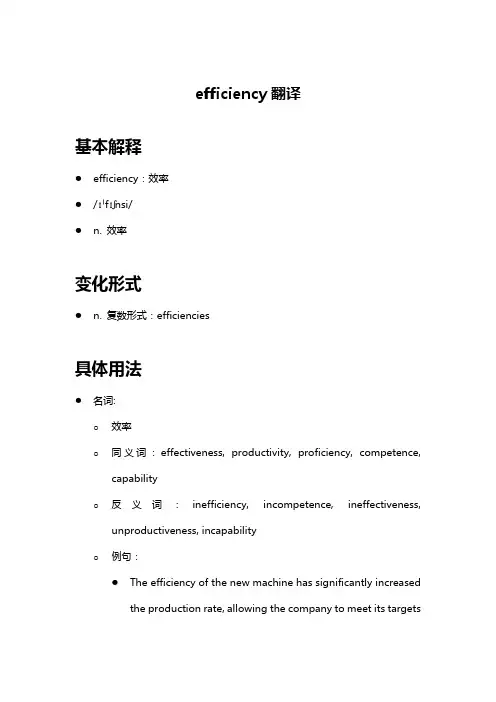
efficiency翻译基本解释●efficiency:效率●/ɪˈfɪʃnsi/●n. 效率变化形式●n. 复数形式:efficiencies具体用法●名词:o效率o同义词:effectiveness, productivity, proficiency, competence, capabilityo反义词:inefficiency, incompetence, ineffectiveness, unproductiveness, incapabilityo例句:●The efficiency of the new machine has significantly increasedthe production rate, allowing the company to meet its targetsahead of schedule. (新机器的效率显著提高了生产速度,使公司能够提前完成目标。
)●By improving energy efficiency, we can reduce our carbonfootprint and save on utility bills, which is beneficial for both the environment and our finances. (通过提高能源效率,我们可以减少碳足迹并节省水电费,这对环境和我们的财务都有好处。
)●The efficiency of the public transportation system in the cityhas made commuting much more convenient for residents, reducing travel time significantly. (城市公共交通系统的效率使居民的通勤更加方便,大大减少了旅行时间。
)●The team worked on improving the efficiency of the process,which resulted in a 20% reduction in production costs. (团队致力于提高流程的效率,结果生产成本降低了20%。
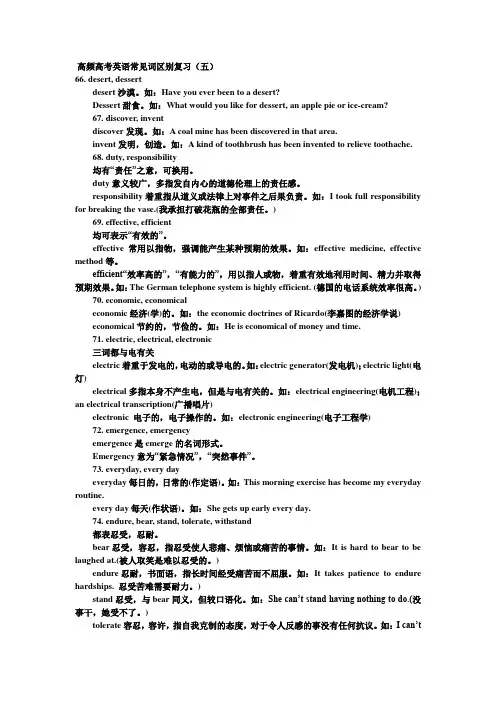
高频高考英语常见词区别复习(五)66. desert, dessertdesert沙漠。
如:Have you ever been to a desert?Dessert甜食。
如:What would you like for dessert, an apple pie or ice-cream?67. discover, inventdiscover发现。
如:A coal mine has been discovered in that area.invent发明,创造。
如:A kind of toothbrush has been invented to relieve toothache.68. duty, responsibility均有“责任”之意,可换用。
duty意义较广,多指发自内心的道德伦理上的责任感。
responsibility着重指从道义或法律上对事件之后果负责。
如:I took full responsibility for breaking the vase.(我承担打破花瓶的全部责任。
)69. effective, efficient均可表示“有效的”。
effective常用以指物,强调能产生某种预期的效果。
如:effective medicine, effective method等。
efficient“效率高的”,“有能力的”,用以指人或物,着重有效地利用时间、精力并取得预期效果。
如:The German telephone system is highly efficient. (德国的电话系统效率很高。
)70. economic, economicaleconomic经济(学)的。
如:the economic doctrines of Ricardo(李嘉图的经济学说)economical节约的,节俭的。
如:He is economical of money and time.71. electric, electrical, electronic三词都与电有关electric着重于发电的,电动的或导电的。
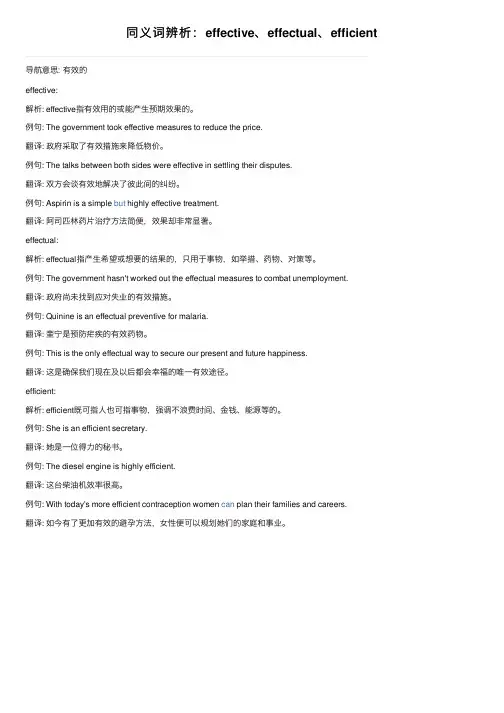
同义词辨析:effective、effectual、efficient导航意思: 有效的effective:解析: effective指有效⽤的或能产⽣预期效果的。
例句: The government took effective measures to reduce the price.翻译: 政府采取了有效措施来降低物价。
例句: The talks between both sides were effective in settling their disputes.翻译: 双⽅会谈有效地解决了彼此间的纠纷。
例句: Aspirin is a simple but highly effective treatment.翻译: 阿司匹林药⽚治疗⽅法简便,效果却⾮常显著。
effectual:解析: effectual指产⽣希望或想要的结果的,只⽤于事物,如举措、药物、对策等。
例句: The government hasn't worked out the effectual measures to combat unemployment.翻译: 政府尚未找到应对失业的有效措施。
例句: Quinine is an effectual preventive for malaria.翻译: 奎宁是预防疟疾的有效药物。
例句: This is the only effectual way to secure our present and future happiness.翻译: 这是确保我们现在及以后都会幸福的唯⼀有效途径。
efficient:解析: efficient既可指⼈也可指事物,强调不浪费时间、⾦钱、能源等的。
例句: She is an efficient secretary.翻译: 她是⼀位得⼒的秘书。
例句: The diesel engine is highly efficient.翻译: 这台柴油机效率很⾼。
你知道临床试验中Efficacy,effectiveness和efficiency的区别吗?:是指药物在实验室中或临床试验研究的理想环境下所能达到的最⼤预期效效Efficacy:是指药物在实验室中或临床试验研究的理想环境下所能达到的最⼤预期果。
为什么医⽣有时觉得治疗指南与现实中的治疗看起来不相关呢?指南多数是由循证的随机对照试验结果⽽得出。
这些试验可以⽤于评估治疗的有效性(efficacy)。
但是,临床试验研究却不能保证没有严重的偏倚。
尽管临床试验研究可能会筛选很多⼈,然后选择其中少数⼈参与研究,但研究的结果可能适⽤于被排除的少数⼈中。
参与试验的研究⼈⼝更趋向于年轻的,⽩种⼈,男性,仅患单⼀疾病,且应⽤单⼀治疗⽅法。
但现实中⼤多数患者并不符合这⼀要求。
他们往往同时患有多种疾病,需要服⽤多种药物,或者年龄太⼩或太⼤,⽽被排除在临床试验之外。
我们应该将“Efficacy”定义为“在理想的情况下,如在⼀个随机临床试验中,药物可达到的预期效果”。
Effectiveness:是指药物在现实临床中是有效的。
与efficacy不同,⼀种治疗如果它在真实条件下有效果,说明这种治疗是有效的(effective)。
在真实条件下,药物的剂量、使⽤频率和患者群体都是临床随机试验研究中所没测试过的。
临床中的有效性是不能在对照试验中进⾏测定的,因为⽆法按照研究规范设置纳⼊标准。
Effectiveness可以被定义为“⼀种药物在真实的临床条件下,通过观察性研究评估其实际疗效。
Efficiency:我们应该多利⽤效益和效率的研究和舍弃⼀些不必要的审查。
Efficiency取决于⼀种药物的价值是否与个⼈或社会⽀付的费⽤相当。
循证医学中最有效的治疗未必是最划算的治疗,也可能是患者难以承受的治疗。
在所有国家都不可能让所有⼈同时享有最合理的医疗保健。
既有良好的临床有效性effectiveness⼜能符合好的成本效益efficiency的研究将使更多患者受益。
效率英语单词以下是20个关于“效率”相关的单词:一、efficiency(效率;效能;功效)1. 单词用法- 作不可数名词。
例如:The new machine has greatly improved the efficiency of production.(新机器极大地提高了生产效率。
)2. 近义词- effectiveness(有效性;效力),productivity(生产力;生产率)3. 短语搭配- energy efficiency(能源效率);efficiency improvement(效率改进)4. 双语例句- We should strive to raise the efficiency of our work.(我们应该努力提高工作效率。
)二、productivity(生产率;生产力;多产)1. 单词用法- 作不可数名词。
例如:High - tech equipment can boost productivity in the factory.(高科技设备能提高工厂的生产率。
)2. 近义词- output(产量;输出),yield(产量;收益)3. 短语搭配- labour productivity(劳动生产率);increase productivity(提高生产率)4. 双语例句- Thepany is trying various methods to enhance productivity.(公司正在尝试各种方法来提高生产率。
)三、effectiveness(有效性;效力)1. 单词用法- 作不可数名词。
例如:The effectiveness of this medicine needs to be further tested.(这种药的有效性需要进一步测试。
)2. 近义词- efficiency(效率;效能),validity(有效性;正确性)3. 短语搭配- cost - effectiveness(成本效益;性价比);effectiveness evaluation(有效性评估)4. 双语例句- We are concerned about the effectiveness of the new teaching method.(我们关注新教学方法的有效性。
Australian Prescriber Vol. 23 No. 6 2000E D I T O R I A LEfficacy, effectiveness, efficiency John Marley, Professor, Department of General Practice, University of Adelaide, AdelaideIndex words: drug utilisation, cost-effectiveness, drug evaluation.(Aust Prescr 2000;23:114–5) How is it, that guidelines for treatment often seem unrelated to the patient sitting in front of the doctor? Guidelines are mostly based on evidence gathered from randomised controlled trials. These trials are very good at assessing efficacy – that is, can a treatment work? Despite this, trials are not without substantial biases. Many people may be screened before a few are chosen to be included in a study, yet the results of the study will be applied to the very people who were excluded. The population studied in trials tends to be young, male, white, suffering from a single condition and using a single treatment. Most patients, at least in general practice, do not fit this description. They often have multiple illnesses, take multiple medications and are either too young or too old to have been included in clinical trials. Perhaps we should accept a proposal to define efficacy in relation to medications as ‘the extent to which a drug has the ability to bring about its intended effect under ideal circumstances, such as in a randomised clinical trial’.*Efficacy is not the same as effectiveness.1 A treatment is effective if it works in real life in non-ideal circumstances. In real life, medications will be used in doses and frequencies never studied and in patient groups never assessed in the trials. Drugs will be used in combination with other medications that have not been tested for interactions, and by people other than the patient – the ‘over the garden fence’ syndrome. Effectiveness cannot be measured in controlled trials, because the act of inclusion into a study is a distortion of usual practice. Effectiveness can be defined as ‘the extent to which a drug achieves its intended effect in the usual clinical setting’.* It can be evaluated through observational studies of real practice. This allows practice to be assessed in qualitative as well as quantitative terms.2Australia is well suited to conduct observational studies because we have a high standard of relatively unrestricted practice and good national databases, such as those held by the Health Insurance Commission. These databases can be used for validating researchers’ separate database effectiveness studies. In America there are very large patient databases held by the Health Maintenance Organisations. Their size is impressive, but size is not everything. The data may have been collected primarily for billing and they may be incomplete. Clinical practice is often governed by protocols, and medications are limited to those supplied by the current preferred providers. The reimbursement mechanism for doctors may mean that they code conditions at the highest severity level. Patients belonging to one of these organisations may not represent the American population as a whole. In Britain, the General Practice Research Database, compiled from practice electronic records, is very useful, especially for studies in pharmacoepidemiology. The British enjoy relatively unrestricted clinical practice, but they do not have readily usable national datasets against which to check the validity of their database studies.It is an irony that drugs are licensed for use almost exclusively on the results of controlled trials, yet they are withdrawn from use because of observational data that would not be acceptable to licensing authorities. Biases are present in observational studies, just as they are in trials, but they can be defined and often controlled for, giving these studies a much greater value than that currently awarded to them.*From a suggested dictionary of pharmacoepidemiology byC. Ineke Neutel, University of Ottawa Institute on Health ofthe Elderly, Research Department, SCO Health Services.43 Bruyere Street, Ottawa CANADA K1N 5C8.114Australian Prescriber Vol. 23 No. 6 2000Efficiency depends on whether a drug is worth its cost to individuals or society. The most efficacious treatment, based on the best evidence, may not be the most cost-effective option. It may not be acceptable to patients. In every country, rationing of health care is a reality. There is no country, however wealthy, that can afford to deliver all the health care possible to the whole of its population at all times. Rationing may be implicit or explicit, but it will happen. Good effectiveness and efficiency studies will make this rationing more informed.Good practical guidelines, such as the Therapeutic Guidelines series, are clearly very important and extremely useful. They could be made even more relevant to the patient in front of the doctor, by being less dependent on efficacy studies. We should make more use of effectiveness and efficiency studies and abandon the censorship of the evidence drawn from them. R E F E R E N C E S1.Haynes B. Can it work? Does it work? Is it worth it? Br Med J 1999;319:652-3.2.Greenhalgh T. Is my practice evidence-based? Br Med J 1996;313:957-8. E-mail: john.marley@.au115。
efficiency词根词缀【原创实用版】目录1.效率的含义与重要性2.efficiency 词根词缀的来源3.efficiency 词根词缀的衍生词汇4.如何运用 efficiency 词根词缀正文一、效率的含义与重要性效率,指的是在单位时间内完成任务的多少。
在生活、工作和学习中,效率的高低直接影响到我们的成果和质量。
因此,追求高效率是提升个人素质和实现目标的关键因素。
二、efficiency 词根词缀的来源英语单词 efficiency(效率)来源于拉丁词根“fficio”,意为“完成、执行”。
在英语中,efficiency 这个词主要由以下词缀构成:1."ef":表示“出、从、离开”的意思,例如:effect(效果)、effer (提供);2."fic":表示“做、制作”的意思,例如:fiction(小说)、form (形式);3."iency":表示“状态、性质”的意思,例如:acuity(锐利)、alchemy (炼金术)。
三、efficiency 词根词缀的衍生词汇基于 efficiency 词根词缀,我们可以衍生出许多相关词汇,如:1.efficiency(效率)2.effective(有效的)3.inefficiency(低效率)4.efficiency-oriented(以效率为导向的)四、如何运用 efficiency 词根词缀在英语学习中,了解词根词缀有助于我们更好地掌握词汇和理解词义。
我们可以通过以下方法运用 efficiency 词根词缀:1.通过词根词缀理解词义:例如,当我们遇到"inefficiency"这个词时,可以通过分析其词根词缀,理解其意为“低效率”。
2.拓展词汇量:了解词根词缀可以帮助我们更好地记忆和掌握相关词汇,例如:efficiency、effectiveness 等。
3.提高阅读理解能力:掌握词根词缀有助于我们在阅读英文文章时,更快速地理解文章中的专业词汇和概念。
efficacy词根词缀efficacy这个词源于拉丁语efficacia,意为生效、功效。
在英语中,efficacy表示某事物的效力、功效、有效性。
这个词并没有明显的词根或词缀,它本身就是一个完整的单词。
然而,你可能会在其他与效果、效能相关的词中找到一些词缀或词根。
例如:Efficacious(有功效的):efficacious是efficacy的形容词形式,表示具有效果或功效的。
Inefficacy(无效):inefficacy表示缺乏效果或无效。
Efficacy Rate(效果率):在某些上下文中,人们可能使用efficacy rate来表示某种效果或功效的百分比或比率。
虽然efficacy本身并没有明显的词根或词缀,但在学习英语时,了解一些常见的词缀和词根有助于理解和记忆单词的意义。
此外,还有一些与efficacy相关的词汇,例如:Effectiveness:这个词表示某事物在实际应用中所能达到的效果或功效。
它与efficacy非常相似,但更强调实际应用中的效果。
Efficient:这个词表示某事物具有高效率、能够产生所需效果的能力。
虽然它与efficacy没有直接的关系,但可以用来描述具有高效能的物品或方法。
Effectual:这个词表示某事物具有高度有效、能够产生所需效果的能力。
它与efficacy非常相似,但更强调效果的强烈和显著性。
Effective:这个词也表示某事物具有效果或功效,但与efficacy 不同的是,它更强调效果的真实性和可靠性。
Efficaciousness:这个词是efficacious的名词形式,表示具有功效或效果的状态或性质。
总的来说,efficacy是一个与效果、效能相关的词汇,它的意义非常丰富。
通过学习和理解这些相关的词汇,可以更好地理解和应用efficacy这个词。
Australian Prescriber Vol. 23 No. 6 2000E D I T O R I A LEfficacy, effectiveness, efficiency John Marley, Professor, Department of General Practice, University of Adelaide, AdelaideIndex words: drug utilisation, cost-effectiveness, drug evaluation.(Aust Prescr 2000;23:114–5) How is it, that guidelines for treatment often seem unrelated to the patient sitting in front of the doctor? Guidelines are mostly based on evidence gathered from randomised controlled trials. These trials are very good at assessing efficacy – that is, can a treatment work? Despite this, trials are not without substantial biases. Many people may be screened before a few are chosen to be included in a study, yet the results of the study will be applied to the very people who were excluded. The population studied in trials tends to be young, male, white, suffering from a single condition and using a single treatment. Most patients, at least in general practice, do not fit this description. They often have multiple illnesses, take multiple medications and are either too young or too old to have been included in clinical trials. Perhaps we should accept a proposal to define efficacy in relation to medications as ‘the extent to which a drug has the ability to bring about its intended effect under ideal circumstances, such as in a randomised clinical trial’.*Efficacy is not the same as effectiveness.1 A treatment is effective if it works in real life in non-ideal circumstances. In real life, medications will be used in doses and frequencies never studied and in patient groups never assessed in the trials. Drugs will be used in combination with other medications that have not been tested for interactions, and by people other than the patient – the ‘over the garden fence’ syndrome. Effectiveness cannot be measured in controlled trials, because the act of inclusion into a study is a distortion of usual practice. Effectiveness can be defined as ‘the extent to which a drug achieves its intended effect in the usual clinical setting’.* It can be evaluated through observational studies of real practice. This allows practice to be assessed in qualitative as well as quantitative terms.2Australia is well suited to conduct observational studies because we have a high standard of relatively unrestricted practice and good national databases, such as those held by the Health Insurance Commission. These databases can be used for validating researchers’ separate database effectiveness studies. In America there are very large patient databases held by the Health Maintenance Organisations. Their size is impressive, but size is not everything. The data may have been collected primarily for billing and they may be incomplete. Clinical practice is often governed by protocols, and medications are limited to those supplied by the current preferred providers. The reimbursement mechanism for doctors may mean that they code conditions at the highest severity level. Patients belonging to one of these organisations may not represent the American population as a whole. In Britain, the General Practice Research Database, compiled from practice electronic records, is very useful, especially for studies in pharmacoepidemiology. The British enjoy relatively unrestricted clinical practice, but they do not have readily usable national datasets against which to check the validity of their database studies.It is an irony that drugs are licensed for use almost exclusively on the results of controlled trials, yet they are withdrawn from use because of observational data that would not be acceptable to licensing authorities. Biases are present in observational studies, just as they are in trials, but they can be defined and often controlled for, giving these studies a much greater value than that currently awarded to them.*From a suggested dictionary of pharmacoepidemiology byC. Ineke Neutel, University of Ottawa Institute on Health ofthe Elderly, Research Department, SCO Health Services.43 Bruyere Street, Ottawa CANADA K1N 5C8.114Australian Prescriber Vol. 23 No. 6 2000Efficiency depends on whether a drug is worth its cost to individuals or society. The most efficacious treatment, based on the best evidence, may not be the most cost-effective option. It may not be acceptable to patients. In every country, rationing of health care is a reality. There is no country, however wealthy, that can afford to deliver all the health care possible to the whole of its population at all times. Rationing may be implicit or explicit, but it will happen. Good effectiveness and efficiency studies will make this rationing more informed.Good practical guidelines, such as the Therapeutic Guidelines series, are clearly very important and extremely useful. They could be made even more relevant to the patient in front of the doctor, by being less dependent on efficacy studies. We should make more use of effectiveness and efficiency studies and abandon the censorship of the evidence drawn from them. R E F E R E N C E S1.Haynes B. Can it work? Does it work? Is it worth it? Br Med J 1999;319:652-3.2.Greenhalgh T. Is my practice evidence-based? Br Med J 1996;313:957-8. E-mail: john.marley@.au115。